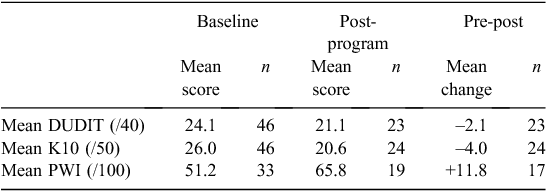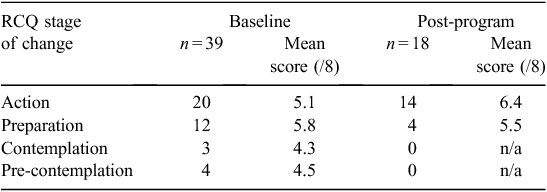Re-Wired: treatment and peer support for men who have sex with men who use methamphetamine
Kent Burgess A D , Garth Parkhill A , Jeremy Wiggins A , Simon Ruth A and Mark Stoovè B CA Victorian AIDS Council, 615 St Kilda Rd, Melbourne, Vic. 3004, Australia.
B Alfred Hospital, 55 Commercial Rd, Melbourne, Vic. 3004, Australia.
C Burnet Institute, Centre for Population Health, 85 Commercial Rd, Melbourne, Vic. 3004, Australia.
D Corresponding author. Email: kent.burgess@vac.org.au
Sexual Health 15(2) 157-159 https://doi.org/10.1071/SH17148
Submitted: 16 August 2017 Accepted: 17 November 2017 Published: 16 March 2018
Journal compilation © CSIRO 2018 Open Access CC BY-NC-ND
Abstract
Background: This paper examines a methamphetamine treatment and peer support program for gay men and other men who have sex with men (MSM) who use methamphetamine. Australian MSM use illicit drugs including methamphetamine at significantly higher rates than the broader community.1,2 Methamphetamine rates are higher again amongst HIV positive MSM. Methamphetamine in the MSM community is associated with sexual activity and may be associated with psychosocial harms including risk of the transmission of HIV and sexually transmissible infections.3,4,7,8 Methods: This paper presents the formal evaluation of Re-Wired, Australia’s first structured methamphetamine treatment and support program for MSM, consisting of a free, six week therapeutic group and Re-Wired 2.0, a follow up peer support group. Data collection included baseline and post intervention administration of the Kessler Scale of Psychological Distress (K10) and the Drug Use Disorders Identification Test (DUDIT), the Personal Wellbeing Index (PWI) and the Readiness to Change Questionnaire (RCQ). This was complemented with qualitative session feedback and a small number of post intervention participant interviews. Results: Program evaluation demonstrated modest improvements in participant psychological distress, personal well-being and stage of change and reductions in methamphetamine use post intervention. Qualitative data revealed benefits of a specialised harm reduction intervention for this population through addressing fear of discrimination and stigma. Conclusions: The presented harm reduction program for MSM who use methamphetamine demonstrates the potential for a specialist peer-based approach to reduce harm in this vulnerable population. This approach may be suitable for adaptation with MSM populations in similar high-income settings.
Additional keywords: Community interventions, drug use, gay men, harm reduction, HIV prevention, HIV risk, illicit drug use, Injecting drug use, peer support, STI risk, therapeutic group.
Introduction
Australian alcohol and drug use data reveals that gay men and other men who have sex with men (MSM) use illicit drugs at higher rates than the broader community.1,2
Approximately 11 per cent of MSM in Australia use methamphetamine, with use even higher (up to 30 per cent) among MSM living with HIV, who are three-fold more likely than those who are HIV negative or of unknown HIV status to have used methamphetamine.3,4 This compares with usage rates of 2 per cent of the general population.1 We know that methamphetamine use in Australia among MSM is commonly combined with sexual activity.3,4 In the Australian context, ‘chem sex’ or ‘party and play’ refers to casual sexual activity (individual or group) that occurs under the influence of polydrug use, where crystal methamphetamine or ‘ice’ is taken, most often in conjunction with GHB, Viagra and amyl nitrate.3,4 Use is generally episodic in nature and many would describe their use as recreational rather than ‘problematic’. However, the limited published material in Australia and the US indicates that a proportion of MSM who use methamphetamine will experience significant harms.5–7 These include a broad range of psychosocial harms. Higher rates of sexually transmissible infections among MSM who use methamphetamine and an association between methamphetamine use and HIV transmission risk in MSM have also been reported.7,8
The Program
The Re-Wired Program is the first targeted program within Australia aimed at addressing methamphetamine use within the MSM community. The program commenced in 2012 and consists of two streams: Re-Wired Therapeutic group intervention and Re-Wired 2.0: Peer Support Group, which was added in 2015.
While a current evidence base is not well-established, a US paper suggests that Programs addressing problematic drug use in MSM communities are most effective when delivered in a community setting, with appropriate community support and follow up.5 Re-Wired is delivered by the Victorian AIDS Council (VAC), a Lesbian, Gay, Bisexual, Transgender and Intersex community-led organisation. The program was developed in direct response to the MSM community’s concerns about the effect that methamphetamine was having within its community.
While there are mainstream substance use programs available, members of the MSM community felt that their specific and unique relationship with methamphetamine and its relationship to sexual practices was not being addressed. Further, they reported that they were reluctant to discuss these issues in treatment settings for fear of being judged, misunderstood and experiencing stigmatisation and persecution.5,9
The Re-Wired Program adopts best practice substance use interventions within a harm-minimisation framework, and tailors these for MSM using methamphetamine. This allows Re-Wired to offer a specialised service addressing the unique context of MSM and methamphetamine use. The Re-Wired Program is also distinctive as it combines both a therapeutic, treatment component with an ongoing peer support model.
Re-Wired assists MSM who use methamphetamine to manage, reduce or cease their use and reduce drug-related and sexual health risk. Re-Wired overtly addresses the potential interplay between methamphetamine use, sex and HIV.
The first core element of Re-Wired is a free, 6-week group treatment program for MSM that equips them with skills and strategies to better manage their methamphetamine use and general health and wellbeing. The group focuses on topics including relapse prevention, methamphetamine and the brain, sleep and nutrition, HIV, sex, pleasure, mental health and mindfulness. A key aspect of the Re-Wired Program is that the professional alcohol and other drug (AOD) facilitators of the program are also members of the MSM community.
Following on from the Re-Wired Program, participants are provided the opportunity to join Re-Wired 2.0, a post-treatment peer support group run by trained MSM volunteers and under clinical supervision. At least one of the peer facilitators of this program is living with HIV, and all must have experience of recovery from problematic methamphetamine use. Re-Wired 2.0 utilises the Self Management and Recovery Training (SMART) model, which is an established framework for substance use peer support.10 Re-Wired 2.0 is an open group program that participants can continue as long as they choose. Re-Wired 2.0 reinforces content from Re-Wired and aims to support maintenance and address relapse. This responds to the ongoing needs of participants and the evidence of the extended withdrawal and recovery periods that frequent users of methamphetamine experience.
Evaluation methodology
The Burnet Institute undertook formal evaluation of the Re-Wired therapeutic group component of the program between 2012 and 2015.9 Baseline data collection included the Kessler Scale of Psychological Distress (K10) and the Drug Use Disorders Identification Test (DUDIT), the Personal Wellbeing Index (PWI) and the Readiness to Change Questionnaire (RCQ). The K10 and DUDIT data was collected during initial participant assessment by AOD counselling intake staff at VAC, and the PWI and RCQ baseline data was collected in the first group therapy program session. These scales were repeated at the final session or within 1 month of Program completion. Anonymous session evaluations were collected during each Program and qualitative interviews were conducted with participants 1 month post Program; 3-, 6- and 12-month qualitative interviews were also attempted.
Outcomes
Fifty-five MSM were assessed by the VAC for the Re-Wired program across five therapy group programs between 2012 and 2015. Over two-thirds of participants (n = 32) that commenced Re-Wired completed the full 6-week program.
Average drug use (DUDIT) and psychological distress scales (K10) showed a modest decrease, and average PWI scores increased considerably from baseline to post-program (Table 1).

|
The RCQ data among respondents completing both surveys indicated an increased willingness to change behaviour related to methamphetamine use (Table 2). Of those in the ‘Pre-Contemplation’ or ‘Contemplation’ stage of change at baseline, all seven respondents moved into the ‘Preparation’ or ‘Action’ stages post-program. Of those twelve respondents in the ‘Preparation’ stage at baseline, 67% moved to the ‘Action’ stage post-program.

|
While 3-, 6- and 12-month evaluation data is limited by low follow-up rates, eight participants were successfully followed up for an interview by evaluators. All eight respondents reported having maintained their goal of abstinence, reduced use or feeling increased control of their use as a result of participating in the Re-Wired Program. Interview data also revealed the importance of the peer aspect of the program and of a specialist program for this population. Feedback supported the integration in treatment of MSM regardless of HIV status as an effective intervention model. Lack of perceived stigma, judgment and discrimination were noted by participants.
As a result of the evaluation, the Program has since been increased from 6 to 8 weeks to attempt to further increase effectiveness.
Conclusions
The Re-Wired harm-reduction program for MSM who use methamphetamine demonstrates the potential for a specialist peer-based approach to reduce harm in this vulnerable population. This approach may be suitable to be adapted to MSM populations within Australia and in similar high-income settings.
Conflicts of interest
KB, GP, JW and SR are employed by The Victorian AIDS Council, which delivers the Re-Wired Programs.
Acknowledgements
MS is supported by a National Health and Medical Research Council Career Development Fellowship.
References
[1] Australian Institute of Health and Welfare. National Drug Strategy Household Survey detailed report 2013. Drug statistics series no. 28. Cat. No. PHE 183. Canberra: AIHW; 2014.[2] Douglas Scott S, Pringle A, Lumsdaine C. Sexual exclusion – homophobia and health inequalities: a review. London: UK Men’s Health Network; 2004.
[3] Lee E, Mao L, McKenzie T, Batrouney C, West M, Prestage G, Zablotska I, de Wit J, Holt M. Gay Community Periodic Survey: Melbourne 2016. Sydney: Centre for Social Research in Health, UNSW Australia; 2016.
[4] Hull P, Mao L, Kolstee J, Duck T, Feeney L, Prestage G, Zablotska I, Lea T, de Wit J, Holt M. Gay Community Periodic Survey: Sydney 2016. Sydney: Centre for Social Research in Health, UNSW Australia; 2016.
[5] Shoptaw S, Reback CJ, Peck JA, Yang X, Rotheram-Fuller E, Larkins S, Veniegas RC, Freese TE, Hucks-Ortiz C. Behavioral treatment approaches for methamphetamine dependence and HIV-related sexual risk behaviors among urban gay and bisexual men. Drug & Alcohol Depend 2005; 78 125–34.
| Behavioral treatment approaches for methamphetamine dependence and HIV-related sexual risk behaviors among urban gay and bisexual men.Crossref | GoogleScholarGoogle Scholar |
[6] Hammoud M, Jin F, Degenhardt L, Lea T, Grierson J, Mackie B, Pastorelli M, Batrouney C, Bath N, Bradley J, Prestage G. Flux: Following Lives Undergoing Change, Gay community life, drug use, and taking care of ourselves and each other, Report 2014–15. Monograph. Sydney: The Kirby Institute, UNSW Australia; 2016.
[7] Hopwood M, Cama E, Treloar C. Methamphetamine use among men who have sex with men in Australia: a literature review. Sydney: Centre for Social Research in Health, UNSW Australia; 2016.
[8] Eu B, Roth N. Association between known recent HIV infections and methamphetamine use (ASK HIM study) in Melbourne between 2011 and 2013: a case-control study. Sex Health 2014; 11 583–4.
| Association between known recent HIV infections and methamphetamine use (ASK HIM study) in Melbourne between 2011 and 2013: a case-control study.Crossref | GoogleScholarGoogle Scholar |
[9] McCormack A, Vella A, Stoové M. Altered states: alcohol and other drug services at the Victorian AIDS Council: final report. Melbourne: Burnet Institute; 2016.
[10] Beck AK, Forbes E, Baker AL, Kelly PJ, Deane FP, Shakeshaft A, Hunt D, Kelly JF. Systematic Review of SMART Recovery: outcomes, process variables, and implications for research. Psychol Addict Behav 2017; 31 1–20.
| Systematic Review of SMART Recovery: outcomes, process variables, and implications for research.Crossref | GoogleScholarGoogle Scholar |


